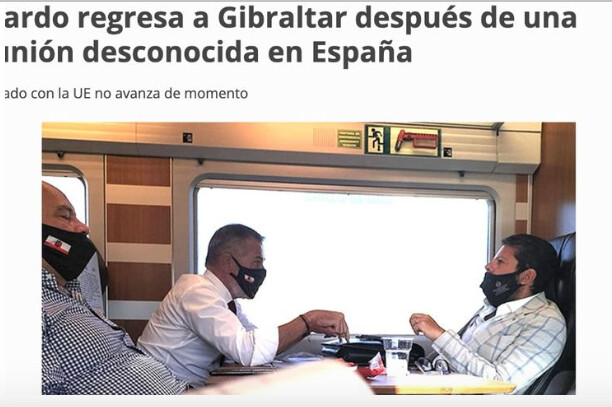The silence is deafening just before Easter on whether a Gibexit ‘deal’ is done or not. Easter was the date within which it was expected that a ‘deal’ would be done between the EU and the UK over Gibraltar following Brexit.
It seems that it has been impossible to get there, it is said, due to intervening events between Russia and the Ukraine. Certainly, there has yet been no announcement of a ‘deal’, one way or another.
RUMOURS
Increasingly, however, there are rumours that a ‘deal’ is done, but that an opportune moment for an announcement needs to be found.
The reality is likely that if a ‘deal’ had been reached, both at a technical and political level, there would be no need to delay any announcement, especially when just prior to the Easter break would be an opportune moment to make an announcement.
It is propitious, because any announcement of any ‘deal’ engaging Spain will likely have its detractors amongst the hardcore “British we are, British we stay” supporters, irrespective that a ‘deal’ will not include sovereignty concessions undermining that core principle held by all.
An announcement just before Easter would have the advantage of avoiding a kneejerk reaction, and would favour a more considered and calmer response. It seems that will not be possible.
Additionally, a delayed announcement impacts on the possibility of a general election before a budget, which will likely need to include unpopular measures.
BUDGET
The 2022 Budget will have to make huge efforts to reverse the deficit that is currently being experienced in recurring public finances.
The deficits have been largely covered by borrowings so far. Those latest borrowings are guaranteed by the UK. The last round of borrowings expires at the beginning of December 2023. The impossibility of repayment in that period is obvious to any observer.
The reality must be that those borrowings will be rolled over, with the UK guarantee also being extended. Roll overs will likely be available for some time to allow for an orderly payment down.
However, any guarantor, in this case the UK, will want to be reassured that those necessary fiscal measures will be taken to put right the deficit, and to allow for some repayment over time. A guarantor will want to see some finality to its guarantee.
The policies to reassure any guarantor will need to be announced in this year’s budget. They will likely need to be quite stringent, so much so that they will affect the pocket of each voter.
ELECTORAL UNPOPULARITY
If there is no election before the budget, which is now looking to be the likely position, due to the lack of any announcement about the Gibexit ‘deal’, then the GSLP-Liberal Alliance Government will have no alternative but to debate and pass this year’s budget in Parliament.
It is a budget that of necessity must include unpopular measures, both to cut expenditure and to raise revenue. Cuts in expenditure are already in process in most departments and publicly financed entities. Just today, the GHA has announced that huge savings will be made by not prescribing over the counter medicines.
Undoubtedly revenue raising measures will include increases in direct and indirect taxes. One would hope that before those who are already paying taxes are hit with higher taxes, those who are paying none will be brought into the tax net and asked to pay something which equates with that paid by taxpayers. Only time and the budget will reveal things.
Whatever may happen at the budget, the enormous likelihood is that revenue raising measures will not prove popular at the polls for the GSLP-Liberal alliance Government.
A REALITY
Whatever the reasons for the deficit in the government’s annual accounts, the reality is that it exists, and despite the past excesses, which have made matters worse, Brexit and the pandemic have had their impact.
The reality is that the deficit impacts on all parties standing at the next general election. The days of making wild promises about giving and spending more are well behind us for many an election.
Those opposing the GSLP-Liberal Alliance will be constrained in making promises. They will be limited to criticising the GSLP-Liberal mismanagement of public finances over the last 11 years, but so what? We will be where we are.
The issue of mismanagement only becomes relevant if any team being presented against the GSLP-Liberal Alliance is seen to be a ‘safer’ pair of hands by the electorate. That will need to be seen by the calibre of candidates presented. The view may well be taken by the electorate that, let those who have made the mess, the GSLP-Liberals get us out of it.
The other reality is that any government formed by anyone other than the GSLP-Liberals will need themselves to take the necessary unpopular financial measures. Doing that will not be liked by voters. Accordingly, its stay in government may well be short lived.
Gibraltar needs to understand, get to grips with and live with the new reality that has been caused by the populist financial decisions taken by our governments since 1998. It is a sad situation brought upon us by financial mismanagement by successive governments, and not just Brexit and Covid-19, which is what the attempted spin and distraction will be.







